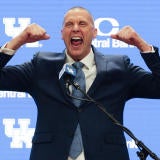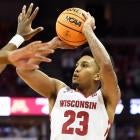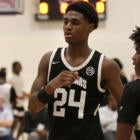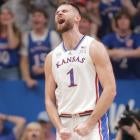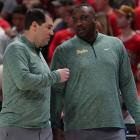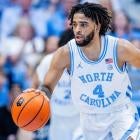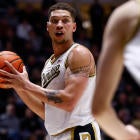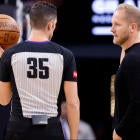NEW YORK — Too often, we attach Cinderella sports stories to teams, not people. Ironic, given the origin story of the metaphor at hand.
Francisco Jose Martin, a child of Cuban exiles, now a man at 51 years of age and having accomplished the implausible by bringing the University of South Carolina to its first Final Four, is a tale never before seen in college basketball. A coach mostly known for his scowl and howl has a story miles deeper than the outward persona that overtakes him every time he steps onto the sideline.
“We all have our paths, there is no A B to C, but Frank’s story is a pretty fascinating one,” Ole Miss coach Andy Kennedy said. “He wasn’t a great athlete, didn’t have a ready-made path or a family member or whatever in the profession. His path was one of grinding and working.”
Martin’s seventh-seeded Gamecocks overcame a seven-point halftime deficit to win by seven points, 77-70, against No. 4 Florida on Sunday afternoon in the East Regional final at Madison Square Garden. After the comeback was complete and the clock dropped to all-zeroes, Martin turned to his ferociously loyal assistants, then opened his arms almost as wide as he dropped his jaw. The big man was mauled with love. He’d just pulled off the biggest coaching Cinderella story in history.
“I’m thinking of my high school coach that took a chance on a guy that wasn’t worth a crap as a player and for whatever reason believed in me,” Martin said afterward. “And became a father figure in my life. I’m thinking of Huggs (Bob Huggins), fighting to give me a chance. Just every guy I’ve coached over 32, 33 years. I’m the luckiest human being in the world. I just continue to have incredible people put in my life. And a lot of people have believed in me and not given up on me when they should have, to be honest with you.”
Truth is, plenty of people did pass on or give up on Martin. He has no kingmaker. Guys like Frank Martin don’t get jobs in power conferences. He is an exception to the rest of the business, a one-of-a-kind success story: former JV high school coach who took his first job at 12 years old at a Dairy Queen because his father ran out on his mother and he wanted to provide.
“Leaves her, never gives her a penny, she never takes him to court,” Martin said. “Doesn’t make excuses. Worked on a salary as a secretary. Raised my sister and I. We’d go to Wendy’s or Burger King every two Fridays, that was our family meal. She gave me the courage to try and do this for a living. Every time I’m in a difficult moment and I got to make a choice and do right or do wrong — I made her cry one time when I was a teenager because I made the wrong choice. I’m never making her cry again for making the wrong choice.”
Tears of amazement overwhelmed Lourdes Martin on the floor of MSG after the game. She’s lived long enough to witness her boy exert his way to the peak of the profession.
“He made it out,” Lourdes said. “He had many, many jobs, and then God was up there and blessed him.”
She stood slightly hunched, trembling with pride in a state of happiness and disbelief that only a mother could exude.
“I’m happy as any mom could be,” she said. “Speechless, but not all the way. I have to talk to him about my air ticket.”
Phoenix awaits. Martin’s spirit dates back to his great grandfather, who fought in Cuba’s war of independence in the 19th century. His mean streak came from his grandmother, who came to America without the ability to speak English and sewed 12 hours a day.
“[My mom], my grandmother and my uncle fought through, I can’t say it any other way: they fought their asses off to give me a chance to move forward,” Martin said as reporters began to encircle on the floor at the Garden. “She’s the strongest woman I’ve ever been around. I’ve got incredible people in my life. My mom, my uncle, they fought to keep me out of trouble.”
Martin had old friends, the guys who got in trouble, in the stands on Sunday. Martin has been handed nothing over the years: he worked as a change boy at a pool hall; was a restaurant dishwasher; a bus boy; toiled in landscaping; sold newspaper subscriptions door to door. Most famously, his bulgy build allowed him to be a bouncer on the side while he worked toward getting a degree at Florida International so he could, one day, become a varsity basketball coach. If fantasies could become realities, maybe college coaching would one day be his calling.
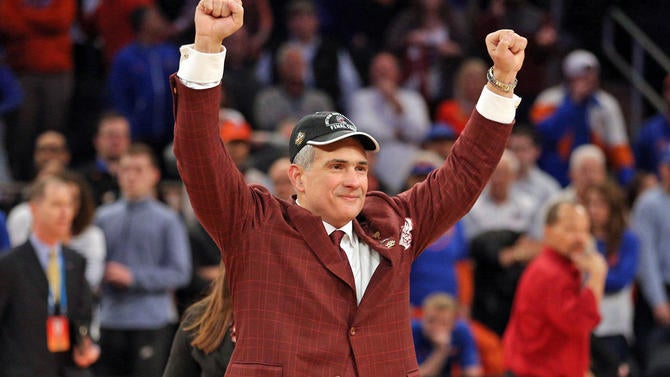
Martin’s road to the Final Four began in Miami, when he took a JV coaching job in the 1980s after the JV coach didn’t show up to work. So they asked Frank to do it. Within two seasons, the team went 22-0. He went part-time to FIU to get his degree, graduating in 1993 — a decade after graduating from high school. It took him eight years, but he eventually was coaching varsity basketball while also teaching math at Miami Senior High. He was a part of eight state championship teams.
Martin left that teaching job to take less money, making $28,000 at Northeastern just so he could wedge a toe through the door of collegiate coaching. That was the first best decision he made. Then came seven more: every time he asked his future wife out on a date. With Frank Martin, everything is achieved through persistence. Including his marriage.
“My wife turned me down seven times to go out on a date,” he said. “Seven. Seven. And the day she made the mistake of going out on a date with me, I never let her go.”
Like Huggins, Martin is one of the most misunderstood men in college basketball. It’s not empty bombast and Bob Knight-style intimidation. It’s unflinching loyalty and a booming passion that gets Martin to link souls with his players. Martin’s guys are as devoted as wolves.
“Huggs has a big heart, very generous and I think Frank falls in that same vein,” Kennedy said. “He’s forced them to take a deeper look based on the incredible run they’ve had. He’s a passionate guy and sometimes that gets misconstrued.”
Huggins took a chance on him in 2004, and college basketball’s been more colorful and interesting ever since. This sport is built off the personalities of its coaches. No coach commands the way Martin does. His force of will and power of personality have changed South Carolina’s history. Heading into this tournament, South Carolina had not made the Big Dance in 13 years and had not won a tournament game, period, in 44. It’s off to its first Final Four, and Martin’s already — through five seasons — an all-time legend in Columbia. Spurrier-level. Maybe now beyond that.
Martin coached his team to a crescendo the past two weeks; the Gamecocks keep getting better. It’s not just the all-sport play of Sindarius Thornwell (an NBA team will find a spot on its roster for that guy); South Carolina has been a machine with how it’s scored in this tournament, averaging 82 points while holding opponents to 68.5. This is the second-best defense in college basketball, and in a fitting coincidence, it will go up against the best defense, Gonzaga, on Saturday in Phoenix.
Florida went cold on Sunday, missing all 14 of its second-half 3-point attempts. This after 10 ties and 13 lead changes prior to the game finding a 63-all knot with three minutes to go. Then the game ended like every South Carolina game has so far in this tournament: the Gamecocks creating separation and exclamation through opportunity. That sounds a lot like the life path of Frank Martin.
Still, the surprise of all of this is the contrast of how South Carolina was playing before the NCAA Tournament. Mocked for being terribly over-seeded after going 3-6 heading into the Dance, the Gamecocks have become the latest semi-annual reminder that this bracket is a monstrous machine of variables. South Carolina, once a nothing program, has stitched together a four-game run that will serve as a model going forward for any team that wants to believe it can reach the Final Four after ending the regular season in a slump.
“If you ever lose your dream or your desire to fight for your dream, then don’t get mad when you don’t get it,” Martin said. “But adversity, adversity, how we handle that, determines what comes forward and go back to my mom, my grandma. They told my grandma, you got to leave your house now. And you’re going to this country where you don’t speak their language. And you got to go sew from 6 a.m. to 6 p.m. and figure it out. She lost her husband to a heart attack, so now she was left with my mom and my uncle as teenagers, didn’t speak a lick of English. Somehow, some way, here I am today. All because of her courage. So, you know, it’s just a lot of stuff, man. A lot of stuff right now. But you can’t lose your dream.”
Martin left Kansas State after irreconcilable differences with his athletic director and took the South Carolina job and many thought he’d fade into obscurity at a program with no tradition. South Carolina was a lackluster program without college basketball pride, a team that won 10 games and finished last in the SEC the year before Frank Martin arrived.
“It’s hard, you see him losing his hair, it’s all white,” Anya Martin, Frank’s wife, said. “In the beginning I had asked him a couple of times, ‘Why here?’ But, you know, Frank’s never steered away from a challenge. As long as I’ve known him he’s overcome any obstacle in his way.”
Martin navigated the chop at South Carolina, steadfast on building a program that was respected if not outright feared. His defense this season has brought alarm to every opponent it’s faced. It’s not well known, but when Martin was working under Huggins’ staff — alongside Kennedy — Martin was the calming influence. He has a serenity to him that’s often ignored.
He’s a grinder, personified, someone not tied to a shoe company or who owes favors to anyone in the business. His name is not part of the annual coaching carousel. He’s in the thick of South Carolina, somewhere he might not ever leave. He convinced in-state stars Sindarius Thornwell and P.J. Dozier, the first McDonald’s All-American from that state in eons to choose to play at South Carolina, to stay home.
“Signing and growing up in South Carolina, all we asked for was a chance to make it,” Thornwell said. “We didn’t ask for -- coach ain’t guaranteed us anything, but to come here and just work hard and give ourselves a chance. All we wanted was to make it. All we wanted was a bid in the tournament, to see our name on the board. And when we got our name on the board, the rest we’ll take, the rest takes care of itself. All we wanted was a chance.”
Martin gave those players and that state hope, a chance, and now he is the toast of college basketball. The big-voiced man who came from so little earned everything on the hard road to becoming the biggest longshot coach in Final Four history.











